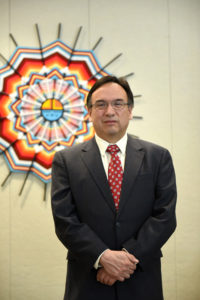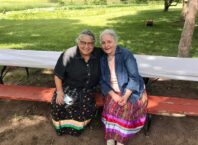LLTC Selects New President
 The Board of Trustees of Leech Lake Tribal College (LLTC) has named Raymond Burns as the college’s new president. Burns succeeds the interim president, Dr. Pat Broker, who served the college as the interim LLTC president from 2017–2018. Burns will take office May 14, 2018.
The Board of Trustees of Leech Lake Tribal College (LLTC) has named Raymond Burns as the college’s new president. Burns succeeds the interim president, Dr. Pat Broker, who served the college as the interim LLTC president from 2017–2018. Burns will take office May 14, 2018.
LLTC’s Board of Trustee’s decision to select Burns was based on his overall track record of 25 years commitment to the higher education of Native American students. Fifteen of those years were spent working with tribal colleges, including a job as President of the Lac Courte Oreilles Ojibwa Community College.
Burns is an enrolled member of the Lac Courte Oreilles Band of Lake Superior Chippewa. He earned his bachelor’s degree from Dartmouth College and received his master’s from Capella University in the field of Leadership in Higher Education. He is currently working on his dissertation for his doctorate through Capella, in Leadership in Higher Education.
Minnesota Book Awards Winners
The Friends of the Saint Paul Public Library has announced the winners of the 30th annual Minnesota Book Awards, sponsored by Education Minnesota. In addition to winners in nine categories, The Friends presented the Book Artist, Hognander Minnesota History, and Kay Sexton Awards to previously announced honorees. Over 800 people attended the awards ceremony at the InterContinental Hotel on April 21. Two Native writers were among the winners for this year’s book awards, Heid Erdrich and Linda LeGarde Grover.
Heid E. Erdrich won the poetry category for “Curator of Ephemera at the New Museum for Archaic Media” (Michigan State University Press). In this collection, Erdrich points to the extraction industries on indigenous lands and how our love of technology threatens our future. A collaborative artist, filmmaker and independent curator, Erdrich teaches in the MFA Creative Writing program at Augsburg College. She is the author of five collections of poetry, including “National Monuments,” a 2009 Minnesota Book Award winner.
Linda LeGarde Grover won the Memoir & Creative Nonfiction category for “Onigamiising: Seasons of an Ojibwe Year” (University of Minnesota Press). Long before the land at the western tip of Lake Superior came to be known as Duluth, it was known to the Ojibwe as Onigamiising, “the place of small portage.” These 50 short essays reflect on the spiritual beliefs and everyday practices that still carry the Ojibwe through the year. Grover, a member of the Bois Forte Band of Ojibwe, is an author and professor of American Indian studies at the University of Minnesota Duluth.
New film is #MeToo Indigenous Response
More than 70 Indigenous people from across Haudenosaunee territories met for the 2018 launch of Rematriation Magazine – “Returning the Sacred to the Mother” at Syracuse University in Syracuse, NY. Rematriation Magazine, an Indigenous women’s online publication, will include feature stories, videos, podcasts, interactives and other multi-media offerings focusing on topics important to Indigenous women. During the meeting, people discussed the #MeToo movement and how it has differed in Indigenous communities from the mainstream. “An Indigenous Response to #MeToo” was a result.
“The #MeToo movement has taken the country by storm and this is why I asked a group of Indigenous people to come together to discuss what is – and what is not – going on so that we can extend the conversation into our communities and take control of the narrative,” says Michelle Schenandoah, chief executive officer and editor in chief of Rematriation Magazine.
“This film is intended to start group conversations within our Indigenous communities. We highlight examples of women and men who’ve created change by leaning into traditional teachings and ceremonies – and the impacts have been profound,” says Schenandoah.
“‘An Indigenous Response to MeToo’ makes a contribution to the conversation on sexual and other forms of gender violence,” says Hayley Marama Cavino, Ph.D., professor of Native American and Indigenous Studies at Syracuse University. “I was particularly struck by the assertion that our communities have long grappled with these issues, as well as how proximate we are to them – a particularly poignant moment in the film comes when one of the participants points out that we are talking about the behavior of fathers and brothers and relatives,” says Cavino.
Rematriation Magazine sponsored the film for free-of-charge viewing by Indigenous nations, organizations, health care providers, educators, community members and those interested in joining the conversation.
The film was produced by Indigenous Concepts Consulting for Rematriation Magazine and features an all-Indigenous cast of community leaders.
View “An Indigenous Response to #MeToo” at https://vimeo.com/261177660. For info, contact Michelle Schenandoah at together@ rematriation.com or 315-925-7191.







